
Number 139 January/February 2021
ISSN 1944-7639 (online version)
Contents
Mellon Foundation Funds CLIR’s Digitizing Hidden Collections and Archives: Amplifying Unheard Voices
Three Questions with CLIR Board Chair Buhle Mbambo-Thata
CLIR Collaborates to Create the First Fully Functional Digital Library in Iraq
Share Your Reflections: One Year with COVID-19
New Material Memory Episode Examines Impact of Climate Crisis on Living Heritage
CLIR Issues is produced in electronic format only. To receive the newsletter, please sign up at https://www.clir.org/pubs/issues/signup. Content is not copyrighted and can be freely distributed.
Follow us on Twitter @CLIRNews, @CLIRHC, @CLIRRaR, @CLIRDLF
Like us on Facebook @CLIRNews
Mellon Foundation Funds CLIR’s Digitizing Hidden Collections and Archives: Amplifying Unheard Voices
The Andrew W. Mellon Foundation has awarded the Council on Library and Information Resources (CLIR) $4,415,000 to support the Digitizing Hidden Special Collections and Archives regranting program. This renewal continues the program’s work with a new thematic focus and includes support for an external assessment. Since its establishment in 2015, the program has distributed over $24 million to digitize collections of rare and unique content in cultural memory institutions.
The forthcoming call, Digitizing Hidden Special Collections and Archives: Amplifying Unheard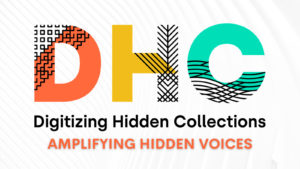 Voices, will invite proposals to digitize materials that deepen public understanding of the histories of people of color and other communities and populations whose work, experiences, and perspectives have been insufficiently recognized or unattended. By funding a cohort of academic, independent, and community-based organizations to digitize now-unavailable or underutilized collections, CLIR will cultivate broad recognition of the value of creating access to resources that document historically marginalized people to the advancement of social justice.
Voices, will invite proposals to digitize materials that deepen public understanding of the histories of people of color and other communities and populations whose work, experiences, and perspectives have been insufficiently recognized or unattended. By funding a cohort of academic, independent, and community-based organizations to digitize now-unavailable or underutilized collections, CLIR will cultivate broad recognition of the value of creating access to resources that document historically marginalized people to the advancement of social justice.
“Working toward inclusivity and equity in digital spaces is fundamental to serving all humanity,” said CLIR board chair Buhle Mbambo-Thata. “We thank the Mellon Foundation for supporting this important new phase of the Digitizing Hidden Special Collections and Archives program.”
“CLIR is grateful for the opportunity to help collecting organizations share rare and unique materials that can help tell the stories of communities, groups, and individuals whose perspectives have too often been ignored,” said CLIR president Charles Henry. “There remains a great deal to be done in the development of digital libraries that can support a complete understanding of human history, and our organization stands to learn a great deal from this program’s participants about the wealth of hidden resources held by organizations that are as-yet untapped.”
With its shift in scope, some adjustments will be made to the program’s guidelines and operations. The details of these changes are still in development and will be finalized and posted to the program website on March 1, 2021, in coordination with the open call for initial applications that will be due April 30. CLIR will host an informational webinar for applicants on March 17 at 3:00 pm ET, and a Q&A webinar on March 30 at 3:00 pm ET. Advance registration is required.
Changes of note include:
- a thematic focus on collections documenting the hidden histories of people who have previously been under-examined or unknown to broader audiences;
- the expansion of the program’s eligibility to include Canadian nonprofit institutions, which were previously allowed to participate only as supporting partners to U.S.-based institutions; and
- a shortened initial application to be reviewed prior to soliciting invitations for full proposals to inform decisions for a final proposal phase.
A review panel, comprising U.S. and Canadian scholars and practitioners from a range of disciplines, will evaluate proposals and select award recipients during a two-part review process. Funding decisions will be announced in April 2022.
CLIR will also undertake an external assessment to evaluate the program’s implementation and identify recommendations for increasing the clarity and transparency of program operations and support of applicants.
Three Questions with CLIR Board Chair Buhle Mbambo-Thata
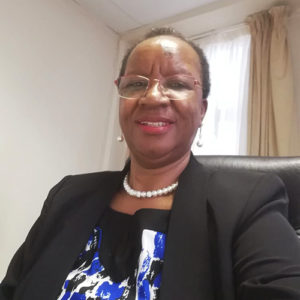
In this edition of CLIR Issues, we are delighted to interview our new board chair, Buhle Mbambo-Thata. Dr. Mbambo-Thata is university librarian of the National University of Lesotho. From 2017 to 2019, she was director of resources development of the African Library and Information Association and Institutions (AfLIA), an independent, nongovernmental organization that connects Africa’s library and information communities. She was executive director of library services at the University of South Africa from 2006 to 2016, and before that she was university librarian at the University of Zimbabwe. In addition to serving on CLIR’s board, she serves on the board of directors of the National Library of South Africa and on the board of African Journals Online (AJOL). She has served as governing board member of the International Federation of Library Associations and Institutions (IFLA) and was a member of the Strategic Advisory Network of the Global Libraries program of the Bill and Melinda Gates Foundation.
1. For several years, you directed library services for South Africa’s premier distance learning university. At a time when the pandemic is impeding physical access to libraries and creating greater needs for remote support of students and teachers worldwide, are there lessons we can learn from UNISA (University of South Africa) going forward that might be applied elsewhere?
UNISA is a premier distance learning university not only in South Africa, but in the southern hemisphere, with more than 200,000 students, so we had to implement student services at scale. I’m now at a university that teaches students that are on campus. When the pandemic hit, I called on a number of things I learned while at UNISA.
When developing services and curriculum at UNISA, we didn’t much think about students who walked into the library, because they were in the minority. We had to think about the students we could never see: imagine their geography, their setup, their challenges, and then deliver the service in that way. When students registered, they were referred to a subject librarian as part of the registration process. The subject librarian would ask how the student wanted to receive information. Older students would often pick courier or post service; the younger students were happy to receive their content digitally. Some of our students lived in what are called informal settlements, so there would be no street address. In cases like that we would find a post office or a public library to deliver books to. And then in some places, our students would be in prisons, so we would have a courier deliver, but in other places, we had a mobile service going to those prisons. Fundamentally, we would deliver service in whatever form we could reach students. You had to think of the students’ context before you straightjacketed them into one form of delivery.
A contact university typically does not ask how you want information delivered, and the pandemic didn’t give any institution a chance to ask. The day the pandemic forced students to leave the National University of Lesotho, I had to put on my UNISA hat as to what to do. How were we going to continue working? The response of many of my colleagues was, “We’ll only work when we reopen.” And my head wasn’t used to that. My head was used to continuing to work to serve students who are not here, and I called on that knowledge to shift service[1].
Because of the pandemic, we had to go to students. Unfortunately, because of the lockdown in many countries, the only services that seemed to be deliverable were digital. And here in Lesotho we knew that some of our students in remote areas would not have access to electricity and laptops and data, so the university had to intervene and provide data for them to access the university, mostly through their phones, and the university would pick up the bill so they could continue learning and we could continue providing service.
2. What do you see as being the greatest challenges today to creating equitable access to information and knowledge? And what gives us reason for hope?
For me, the challenge is to identify the barriers that we need to remove to ensure that information flows. We need to watch out for the things that exclude other groups and people from information and remove them. In some countries, the barrier is the digital divide. In others, it is legislation—legislation that says you can’t translate, or that you can’t move an item from print format to audio for blind people, or that you cannot photocopy. In some countries, the barrier is the printed word. For example, in Africa, a lot of us have a mother tongue and we go to school and we learn English. So, you look for ways to help those who must learn to speak and work in English. Or you find ways to promote mother tongue learning, so that people can learn in their language. You make sure that your libraries promote learning in other languages or books in other languages.
Blindness to the barriers is also a challenge. People don’t necessarily do it deliberately; it’s quite easy not to see that something is a barrier to equitable access to information. For many years, I have worked to remove gender barriers to information and communications technology and ensure that it doesn’t exclude women, particularly in higher education.[2] At one university, I wondered why there were always more young men at the computer workstations than young women, and why there were more male students than female students. If you don’t think with a gender lens you might just see students. So sometimes you have to think beyond what is normal and question why there are certain groups, but not others. Why there are there some types of people in management and not others? What could be the issues?
What gives me reason for hope is that there are people who are willing to question what we take as normal. There are people who are willing to ask, “Why?” And there are people who are willing to point out that perhaps something needs attention. We should be grateful that we have people who can do that. And perhaps more of us should question, more of us should observe, more of us should speak out when there are issues of exclusion—when other groups are not at the table, and other groups are not being heard.
3. What aspects of CLIR’s work most excite you and which do you feel will be most important for the future?
What really excites me is the hidden collections program, because that gives us an opportunity to explore—to expose something that would otherwise be hidden. It also resonates with my life’s goal of making other voices heard and ensuring that in digital spaces, those voices are amplified. I have often said that we need to occupy digital spaces with African information and African knowledge. The more people that occupy digital spaces, the better the world will be.
I also have a very keen interest in people development, so the Leading Change Institute is of great interest to me. I’d like to know that we have left the world a better place, and that there are people who will carry on and improve on the things that we’ve started—that we can pass the baton to somebody who won’t drop it. A lot of training goes into accepting the baton. For me, programs like that are critical for sustaining humanity but also sustaining the work that we have started.
For the future, the idea of Pangia is important to me, because it speaks to collaboration. It speaks to sharing, to exploring unexplored spaces, to doing stuff together to improve our work, and to trying something that’s not been tried before. Why do something that everybody else has done when there is an opportunity to try something new and work toward your future? Universities talk about blue sky research, of going after those things that are not just serving the problems of the moment, but that are stretching you and working into an unknown world. That’s what I find inspiring about Pangia.
What we need are partners that share this dream, including funders to help make it a reality. I was many years associated with the Gates Foundation’s Global Libraries Program, and among other things, the program funded innovative projects that might be viewed as risky. It was important to try something out because of what could be learned from it. If a project did not achieve its goal, it was not considered a failure or a waste of resources, and I hope that we’ll be able to form alliances that share the dream of Pangia and are willing to contribute resources and enable CLIR to try it. And if it falls short, it’s okay. We’ll learn from it and get up and do it differently. And eventually, we will celebrate a reality of Pangia.
[1] Buhle Mbambo-Thata describes the shift from contact teaching to e-learning in greater detail in her article, “Responding to COVID-19 in an African University: The Case of the National University of Lesotho Library,” Digital Library Perspectives, October 2020.
[2] See Buhle Mbambo-Thata et al., “Gender Inclusivity and Equity in Academic Libraries: Insights from Around the Globe,” College & Research Libraries News v. 80, no. 8 (2019).
New Report Offers Recommendations for Working with Archives and Libraries in Latin America and the Caribbean
A new CLIR report presents recommendations from a symposium focused on equitable practices for enhancing engagement with librarians, archivists, and other cultural heritage professionals in Latin America and the Caribbean. Capacity Assessment of Latin American and Caribbean Partners: A Symposium about Open Access, Technological Needs, and Institutional Sustainability was organized in April 2020 by CLIR Postdoctoral Fellows in Data Curation for Latin American and Caribbean Studies Hadassah St. Hubert, Jennifer Isasi, Nicté Fuller Medina and Margie Montañez.
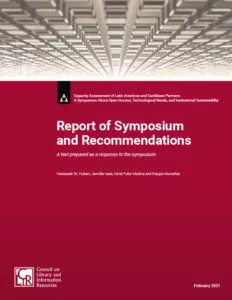 The fellows, who are also the report’s authors, write that the symposium “centered the voices of a group of institutions in Latin America and the Caribbean by providing a forum for these stakeholders to share strategies and identify common areas of need.” Based on the discussions, the authors set forth recommendations for Latin American and Caribbean institutions considering a digitization project in partnership with US-based institutions. They also outline a set of questions for funders, libraries, archives, and others based in the United States, Canada, and European nations to consider when evaluating grant proposals for digital projects, or when considering post-custodial archival work with institutions in Latin America and the Caribbean.
The fellows, who are also the report’s authors, write that the symposium “centered the voices of a group of institutions in Latin America and the Caribbean by providing a forum for these stakeholders to share strategies and identify common areas of need.” Based on the discussions, the authors set forth recommendations for Latin American and Caribbean institutions considering a digitization project in partnership with US-based institutions. They also outline a set of questions for funders, libraries, archives, and others based in the United States, Canada, and European nations to consider when evaluating grant proposals for digital projects, or when considering post-custodial archival work with institutions in Latin America and the Caribbean.
The report is available in five languages: English, French, Haitian Creole, Portuguese, and Spanish. The symposium was supported by a grant from CLIR. The grant program is made possible by funding from The Andrew W. Mellon Foundation.
CLIR’s Postdoctoral Fellowship Program offers recent PhD graduates the chance to develop research tools, resources, and services while exploring new career opportunities. The Postdoctoral Fellowships in Data Curation for Latin American and Caribbean Studies, a program track that ran from 2017 to 2020, supported international partnerships in the service of cross-disciplinary research and in building greater capacity for digitizing original materials, sharing related digital data, and developing humanities computing.
CLIR Collaborates to Create the First Fully Functional Digital Library in Iraq
United States Consul General Rob Waller visited the Kurdish Heritage Institute (KHI) in Slemani in the Kurdish Federal Region of Iraq on February 2 to celebrate the introduction of the first fully functional digital library in Kurdistan and Iraq, a project implemented by CLIR. Project co-directors Amed Demirhan and Peter Herdrich led the effort with support from CLIR and KHI staff.
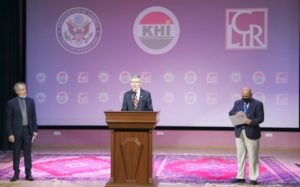
In 2019, CLIR was chosen by the U.S. Embassy in Baghdad from among more than 20 applicants to lead their “Digitalization of the Kurdish Heritage Institute Collection” project. Herdrich explained the project goals in a video played at the celebration. “We had two critical goals. The first is a cultural heritage preservation goal—create digital records of the KHI collections, securing and preserving the information about the objects. The second was to use those records to build a functional digital library, so we could all share and use the KHI collections.”
The first year was spent in equipment provision, training the team to document and digitize collection materials, and processing thousands of books on Kurdish culture. After one year, CLIR received a grant extension to fund cataloging and publication of the records to the KHI website using Omeka. Now, digital copies are online and accessible around the world. CLIR president Charles Henry offered his perspective, via video:
“The fact that the worldwide Kurdish community… now has access to digital copies of the books, music, and photos of the Kurdish Heritage Institute is a significant achievement. It places Kurdish culture within reach of everyone around the world and associates it with the world’s great digital libraries.”
Video of full presentation is available here.
The KHI project exemplifies the complexities and strengths of digital libraries. It makes the world smaller, in that so many people can access these important resources without leaving their homes or local libraries. And it makes the world larger: the KHI project can in time serve as a means to train skilled professionals, create new jobs, and strengthen the local economy; serve as a means to educate a very wide audience on the importance and sophistication of Middle Eastern cultures; help instill respect for and deeper understanding of this record of our culture and our shared humanity; and bridge generations, providing an invaluable resource for contemporary populations as well as those who will come after us.
Share Your Reflections: One Year with COVID-19
In March 2020, CLIR started the COVID (Re)Collections blog series to help people in the information field process COVID-19 and share their responses as the situation evolved. As we approach the one-year anniversary of the World Health Organization declaring COVID-19 a global pandemic, CLIR would like to offer a platform where practitioners can reflect on how the field has changed over the past year, grieve for all we’ve lost, and look ahead.
Contributors can respond to any of the following questions or suggest their own topic: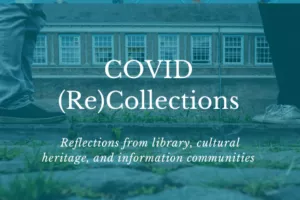
-
- In what ways has COVID-19 changed the way you work? How has it changed how you think about information? What changes to the field or your practice are likely to endure beyond the pandemic?
- What is the relationship between your professional and personal experience? How did other events in 2020 and early 2021 affect how you approached and experienced the first year of COVID-19?
- What are some ways people in the information field have cared for their colleagues, their communities, and themselves? Where was more care needed?
- What should the field be doing moving forward to build resilience and support our communities?
Fill out this form to propose a COVID (Re)Collections piece. You can either contribute a piece or volunteer to be interviewed by someone on CLIR’s communications team for publication. For more information and to read earlier posts from the series, visit clir.org/covid-recollections/. Stay tuned for our next post on February 23!
DLF Groups: 2020 in Review
Did you know that there are 12 DLF groups working on topics that range from privacy & ethics in technology to digital library pedagogy? The February DLF Groups Newsletter highlights several of the groups’ impressive achievements last year. For years, DLF groups have been coming together across geographic and institutional boundaries to foster engaged communities of practice among digital library and GLAM (galleries, libraries, archives and museums) practitioners. As new challenges emerged in 2020, the spirit of collaboration engendered by the working groups allowed them to thoughtfully respond to these challenges while continuing to engage in the significant work and contributions they bring both to the DLF community and the GLAM fields at large.
Sign up for the newsletter to get regular updates. The groups welcome new members year-round, and you do not have to be affiliated with a DLF member institution (or any institution) to join.
Alyson Pope Joins CLIR Staff
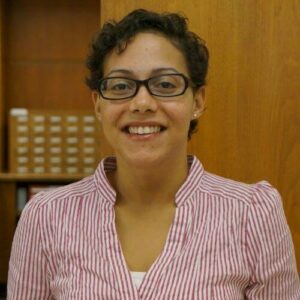
We welcome Alyson Pope as CLIR’s grants and contracts manager. In this newly created role, Pope will provide administrative oversight for grants and contracts that CLIR awards, as well as grants received to fund its programs. Pope, who joined the staff in early February, was previously head of library public services/head of user services at Pittsburgh Theological Seminary, where she also operated as a project coordinator on the institution’s $13 million library renovation. She earned her MLIS from the University of Pittsburgh and her B.A. in Professional Writing from Carnegie Mellon University. Pope is based in Pittsburgh with her partner Brendan and looks forward to meeting all of the CLIR staff in person.
New Material Memory Episode Examines Impact of Climate Crisis on Living Heritage
Season 2, episode 5 of CLIR’s podcast, Material Memory, is now available. “Living Heritage,” focuses on the threats of the climate crisis to intangible, or “living” cultural heritage—language, food, folk arts, festivals, and other traditions handed down between generations. Living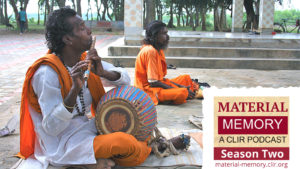 heritage often requires a different approach to preservation than do artifacts or historic sites. In this episode, host Nicole Kang Ferraiolo talks to media and culture scholar Saiful Alam Chowdhury about living heritage in Bangladesh, the urgency of preservation in a country vulnerable to the impacts of rising sea levels, and the role of media in getting people to take action. Listen to the episode here, or on your preferred podcast app.
heritage often requires a different approach to preservation than do artifacts or historic sites. In this episode, host Nicole Kang Ferraiolo talks to media and culture scholar Saiful Alam Chowdhury about living heritage in Bangladesh, the urgency of preservation in a country vulnerable to the impacts of rising sea levels, and the role of media in getting people to take action. Listen to the episode here, or on your preferred podcast app.
In episode 4, last month, we heard from Victoria Herrmann, president and managing director at the Arctic Institute, about climate change and forced displacement in the United States, and what it means for different communities and their cultural heritage.
Stay tuned for episode 6 in March, when host Nicole Kang Ferraiolo and archivist Itza Carbajal will discuss anti-colonial models for transnational archiving and what this looks like in a digital environment. Carbajal will share her personal experience as someone displaced by Hurricane Katrina in 2005 and how that experience informed her climate activism today as well as her archival work with marginalized communities.
See all of the season’s episodes here, and subscribe to ensure you never miss an episode!
